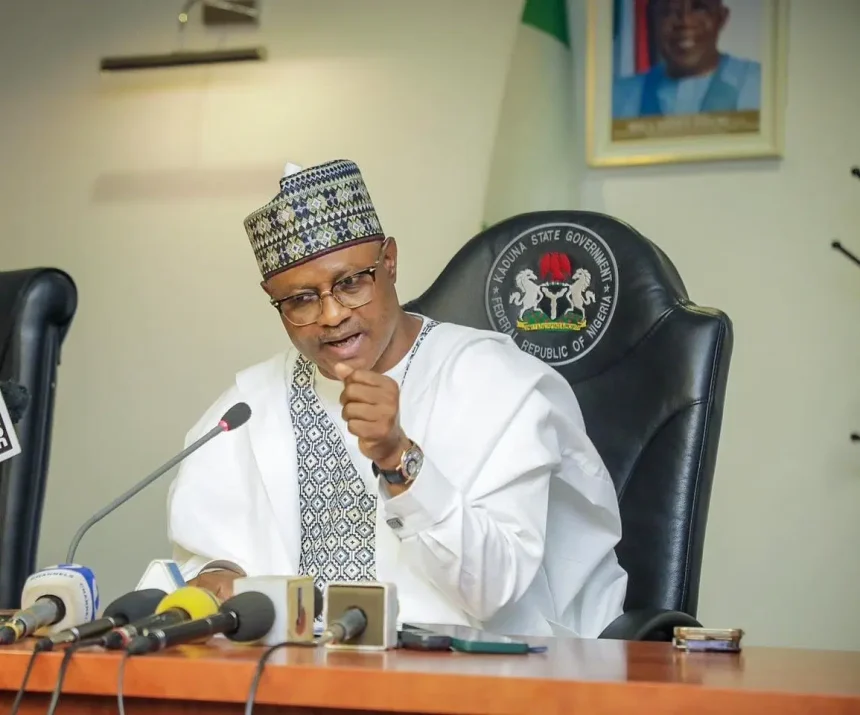…500,000 hectares of land recovered in Birnin Gwari
Kaduna State Governor, Senator Uba Sani, says his administration has recorded significant progress in tackling insecurity, with the reopening of 162 previously shut schools and 222 primary healthcare centres across the state.
Speaking during an interview on Politics on Sunday, a TVC programme anchored by Femi Akande, the governor said the state’s security strategy, built on both kinetic and non-kinetic approaches, has restored normalcy in several troubled local government areas, particularly Birnin Gwari.
Sani noted that when his administration assumed office in 2023, insecurity in Kaduna was severe and distinct from that in the North-East. While terrorism was dominant in Borno, Yobe, and Adamawa, he said the North-West’s crisis was largely rooted in economic challenges.
“The first thing we did was to look at the situation holistically. We realised that the insecurity in Kaduna was different. It was largely economic. So, we adopted a dual approach, military action on one hand, and dialogue, community engagement, and development on the other,” Sani explained.
The governor credited community leaders, religious leaders, and traditional institutions for playing a decisive role in stabilising Birnin Gwari, once regarded as one of the most dangerous parts of the state.
“At the issue of insecurity in Birnin Gwari today, I can say we have addressed the challenge simply because it was not government driving the process alone. It was largely community-based. The traditional leaders and religious leaders gave us full cooperation,” he said.
Sani recalled that as recently as December 2022, when President Bola Tinubu (then a presidential candidate) visited Kaduna, the delegation needed 30 armoured vehicles to travel to Birnin Gwari because of rampant kidnappings.
“Today, you can go to Birnin Gwari without fear. About 500,000 hectares of abandoned farmlands have been recovered, and people are back to farming. Markets that were closed for over a decade, including cattle and grain markets, have reopened,” he stated.
Beyond Birnin Gwari, the governor said relative peace had returned to Giwa, Kachia, Zangon Kataf, Kauru, and Igabi local government areas. The improved security allowed government to reopen schools and healthcare centres that had been shut for years.
“People have gone back to their normal activities. For me, these are very important signs of success,” Sani declared. He added that several security chiefs across Nigeria had openly praised Kaduna’s model and urged other states to replicate it.
Sani, a former senator, also reiterated his strong support for the establishment of state police, describing it as essential for managing Nigeria’s vast ungoverned spaces.
“When I was in the Senate, I sponsored the bill for the creation of state police. My reason was simple, we lack boots on the ground. Nigeria has less than 300,000 military personnel and under 400,000 police officers. Combined, that’s under 700,000 for a country of over 200 million people,” he explained.
He welcomed the growing consensus among governors on the matter, revealing that at the recent National Economic Council (NEC) meeting, virtually all governors, except one, backed the creation of state police.
“A lot of people fear governors will abuse state police, but that is why we have a constitutional amendment process. The safeguards can be built into the law to prevent abuse,” he said.
The governor emphasised that his approach to security goes beyond deploying soldiers and police. He stressed that governance, community trust, and economic empowerment were central to sustaining peace.
“Non-kinetic approach does not mean telling the military to put down their arms. It’s about good governance, carrying people along, ensuring rural dwellers benefit from government programmes, and making sure farmers can return to their farms,” he explained.
According to him, one of the major reasons insecurity persisted in the North-West was the deep mistrust between communities, government, and security agencies. His administration, he said, made deliberate efforts to rebuild that trust.
Sani, who served as Kaduna Central senator before becoming governor, highlighted his legislative background to back his push for security sector reform.
“As a lawmaker, I sponsored over 32 bills, seven were passed, and three became laws. I understand lawmaking. When we talk about creating state police, we’re talking about amending the constitution to provide the framework. The fear of abuse is misplaced because it all depends on how the law is drafted,” he said.
Governor Sani maintained that while progress has been made, sustaining security in Kaduna requires continuous community engagement, economic empowerment, and federal support for state policing.
“The people are back in their farms, our children are back in school, our healthcare centres are working again. That’s progress. But to keep it, we must keep building trust, keep supporting our communities, and ensure our laws allow us to protect them effectively,” the Governor added.
ALSO READ TOP STORIES FROM NIGERIAN TRIBUNE
WATCH TOP VIDEOS FROM NIGERIAN TRIBUNE TV
- Relationship Hangout: Public vs Private Proposals – Which Truly Wins in Love?
- “No” Is a Complete Sentence: Why You Should Stop Feeling Guilty
- Relationship Hangout: Friendship Talk 2025 – How to Be a Good Friend & Big Questions on Friendship
- Police Overpower Armed Robbers in Ibadan After Fierce Struggle






